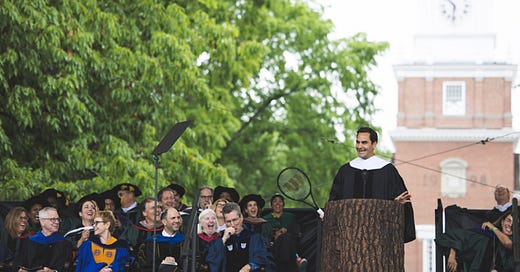Excerpts from Roger Federer’s 2024 commencement address at Dartmouth College – where he also received an honorary doctorate degree
Effortlessness is a myth
During his professional tennis career, Federer won 20 Grand Slam titles. It often has been said that his consistent style of play made it look like he was having an easy time on the court.
Not so, he bristles. Dr. Roger characterizes the notion that his play was “effortless,” as a “myth”. Effortlessness lacks consideration of all the preparation and hard work that went into his success.
“Hopefully, like me, you learned that ‘effortless’ is a myth,” Federer told the Dartmouth graduates. “I didn’t get where I got on pure talent alone. I got there by trying to outwork my opponents. I believed in myself. But belief in yourself has to be earned.
“Yes, talent matters,” he continued. “I’m not going to stand here and tell you it doesn’t. But talent has a broad definition. Most of the time, it’s not about having a gift. It’s about having grit. In tennis, a great forehand with [strong] racquet head speed can be called a talent. But in tennis... like in life... discipline is also a talent. And so is patience. Trusting yourself is a talent. Embracing the process, loving the process, is a talent. Managing your life, managing yourself... these can be talents, too. Some people are born with them. Everybody has to work at them.”
Even with all his natural tennis talent, Federer told his audience, he had to work tirelessly to win matches so he could reach and remain on top.
Overcoming losses
During his remarks, Federer revealed a fascinating statistic: Even with all his success in major tournaments and in winning 80% of his matches, he still lost a lot. And, in fact, he only won 54% of his points.
With that slim a margin, a player must recover constantly from losses both small and large.
"You want to become a master at overcoming hard moments," advised Federer. "That is, to me, the sign of a champion, the best in the world. And, not the best because they win every point. It's because they know they'll lose again and again, and have learned how to deal with it.
"You move on, be relentless, adapt, and grow."
Additionally, Dr. Roger stated: “The truth is, whatever game you play in life, sometimes you’re going to lose ... But negative energy is wasted energy.”
Be a good person
Being a great athlete wasn’t enough for Federer. He strove to be a good person, too.
During the address, Roger talked at length about his family’s support as well as about the aid from his longtime manager and others who encouraged him along the way – in both good and bad times. All that, the 20-time Grand Slam winner said, gave him the ability to be a good person in addition to being a great athlete.
WIIFY?
Roger Federer addressed a college graduating class. As is (hopefully) traditionally the case, he dispensed his wise advice generated by a life of working hard to perfect his natural skills.
What if the address wasn’t to college graduates? What if you had to present to a group of Age-defying Athletes? What wise advice would you offer them?
Probably words not so dissimilar to those Federer dispensed at Dartmouth: be determined, work hard, don’t give up, and be a good person.
What are you waiting for?!




